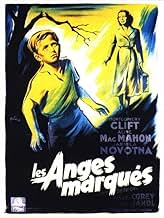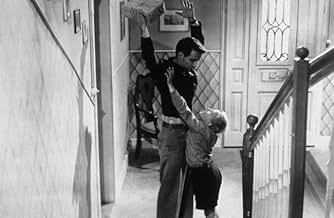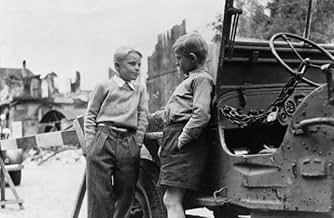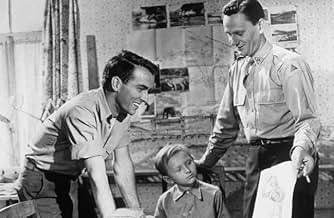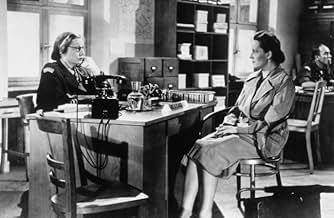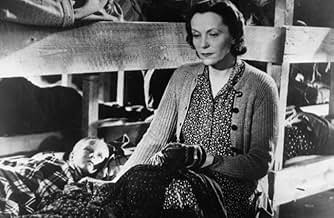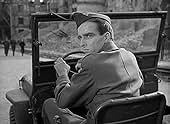IMDb RATING
7.8/10
5.2K
YOUR RATING
In post-war Berlin, an American private helps a lost Czech boy find his mother.In post-war Berlin, an American private helps a lost Czech boy find his mother.In post-war Berlin, an American private helps a lost Czech boy find his mother.
- Won 1 Oscar
- 7 wins & 7 nominations total
Featured reviews
After watching Roberto Rossellini's 1947 final part of his war trilogy "Germania anno zero", Fred Zinnemann's "The Search" is in direct contrast. While Rossellini approaches a similar subject with absorbing objectivity, "The Search" opts for sentimentality, although Zinnemann tried to add a documentary dimension to the story. It's the tale of a boy who is rescued by an American G.I. in Berlin, while the boy's mother is looking for him in refugee camps, after they were separated in Auschwitz during the war. Mother and child are pretty close but do not know it, so the story goes from scenes of the soldier educating the boy, to the mother's giving love to surrogate sons in a UN home for war orphans. Zinnemann's tact (or lack of passion, as some may say) nevertheless makes it work, as well as the performances by Montgomery Clift as the soldier and young Ivan Jandl as the kid, who won a special Oscar.
I got to this movie randomly in the night program and found it was rather undeservedly relegated to past 11pm duties on TV. For Germans, it may be hard to chew the past concentration camp experiences of Children survivors in English and American orphanages and the highlighted search of a mother for her young boy, from whom she has been separated during the war. Sentimental : Yes Heart Gripping : Yes Wonderful to watch to the (happy ???) ending ? Yes all over. Great performances by the young boy, Ivan Jandl, the mother and the orphanage manager and very convincing performances of Montgomery Clift and Wendell Corey as teachers and father stand ins. I do know the ending, but it grips me nevertheless, even on replay. And if you're not icy to the heart, it will do the same for you.
10lugonian
THE SEARCH (Metro-Goldwyn-Mayer, 1948), directed by Fred Zinnemann, as mentioned after the opening credits, was produced in Switzerland and in the United States occupied zone of Germany through the permission of the United States Army and through the cooperation of the I.R.O. It was the first postwar movie to be filmed in an occupied zone. Looking at the background of destroyed buildings and broken streets, it's just a crucial reminder of the suffering amongst those European families and how horrible a war can be. Currently shown on Turner Classic Movies and once available on video, it's become one of the most requested from viewers, and rightfully so. Running at 105 minutes, there isn't a single frame wasted in the story, no scenes are unnecessary.
The plot in brief: Set in post World War II, a war orphan (Ivan Jandl, in his only movie role) is sheltered by an American G.I. (Montgomery Clift), while all that time, his mother (Jarmila Novotna), who has survived the hardship of the concentration camp, searches for him, knowing in her heart, that he is very much alive. And when the G.I. decides he wants to take the boy he calls "Jim" back with him to America, suspense builds for the viewers knowing that the mother is not that far away, and how they nearly miss each other in a couple of scenes. Aside from this being Clift's first movie to be released and his second film role, and that Ivan Jandl as Karel will steal one's heart, especially with his sad face, Aline MacMahon (1899-1991), as Deborah H. Murray, superintendent of the orphanage for war orphans, as well as the off screen narrator, gives possibly the best dramatic performance of her career, so sincere and natural, especially her devotion to those other children, one forgets that she's just an actress playing a role. Even her somewhat sad face adds to her personality and character. I only wished she had won, or at least been nominated, for an Academy Award for Best Supporting Actress for this performance. She deserved it. Clift, whose gun chewing soldier character comes about 45 minutes into the movie, also gives a sincere performance, and was nominated for Best Actor. Wendall Corey appears in support as Clift's Army buddy, Jerry Fisher.
I rank THE SEARCH one of director Zimmermann's most admired films, and one I never get tired of seeing whenever it's shown. Thank goodness TCM avoids showing the colorized version of THE SEARCH. Be sure to have your tissue box handy. (****)
The plot in brief: Set in post World War II, a war orphan (Ivan Jandl, in his only movie role) is sheltered by an American G.I. (Montgomery Clift), while all that time, his mother (Jarmila Novotna), who has survived the hardship of the concentration camp, searches for him, knowing in her heart, that he is very much alive. And when the G.I. decides he wants to take the boy he calls "Jim" back with him to America, suspense builds for the viewers knowing that the mother is not that far away, and how they nearly miss each other in a couple of scenes. Aside from this being Clift's first movie to be released and his second film role, and that Ivan Jandl as Karel will steal one's heart, especially with his sad face, Aline MacMahon (1899-1991), as Deborah H. Murray, superintendent of the orphanage for war orphans, as well as the off screen narrator, gives possibly the best dramatic performance of her career, so sincere and natural, especially her devotion to those other children, one forgets that she's just an actress playing a role. Even her somewhat sad face adds to her personality and character. I only wished she had won, or at least been nominated, for an Academy Award for Best Supporting Actress for this performance. She deserved it. Clift, whose gun chewing soldier character comes about 45 minutes into the movie, also gives a sincere performance, and was nominated for Best Actor. Wendall Corey appears in support as Clift's Army buddy, Jerry Fisher.
I rank THE SEARCH one of director Zimmermann's most admired films, and one I never get tired of seeing whenever it's shown. Thank goodness TCM avoids showing the colorized version of THE SEARCH. Be sure to have your tissue box handy. (****)
Enjoyed this film from beginning to the very end because of a great story about children who were separated from their parents by Nazi Germany and they were also placed in concentration camps and marked with a number like cattle. Montgomery Clift, (Steve Stevenson) plays the role as an Army personnel who finds a very young boy who is starving and gives him some of his lunch. This young boy is named Karel Malik, (Ivan Jandl) who learns to speak English from Steve and starts to forget some of his horrible experiences. However, Karel begins to want to find his mother who is Mrs. Hannah Malik and Hannah is searching all through the ruins of bombed out towns trying to find her son. There is great acting by Montgomery Clift and Wendell Corey and this is a horrible story about the effects Hitler had on young children, men and women who were treated like animals. Great Gem of a Film !.
The Search (1948)
This is a critical film in director Fred Zinnemann's career. After years of doing shorts and B features, and after WWII had ravaged the world, he turned to a subject that must have ripped him up every day he was shooting. The story of orphaned kids, most of the Jewish, in the rubble of post-War Germany.
You see, both his parents were killed by the Nazis in the war. And here he was, a man with roots in documentary film in the 1930s, making real one of the remaining problems recovering from Nazi mess, these displaced children. The black and white filming is gritty and polished at the same time, and much of it is shot on location in the real ruins of Germany in the American sector (in Nuremberg). For that alone it's worth seeing.
By the way, the interior work was done in a Swiss garage—the crew for the whole film consisted of a total of ten Swiss technicians and a truck. Though the movie was an American release, the main producer was Swiss, too. All of these are reasons why it feels different than what Hollywood might have attempted on studios lots, and probably failed at least in authenticity.
Throw in that Montgomery Clift is starring in the lead role and you have another reason to watch. He's really wonderful, already feeling like the mature, charming, disarming young man he is famous for on screen. Be warned however—he doesn't show up until nearly halfway through. The first half of the movie is touching but makes for disappointing drama, forming a quasi-documentary overview of the horrid situation but with a voice-over that means well but makes it almost sentimental instead of tragic. Be sure to stick it out until the real plot kicks in with Clift sitting in a Jeep.
There are other actors here—the mother looking for her child is an opera singer in real life and is more pathetic than persuasive, and the chief nurse, played by Aline MacMahon, is terrific. Still, the movie, and the screen time in the second half, is Clift's, thankfully, and the boy's. This child was discovered while scouting for the movie, apparently, and is a Czech kid names Ivan Jandl. Amazingly, he knew no English when the movie started, and was coached by Clift as they went, very much like happens in the movie. This obviously makes it more convincing top to bottom.
And makes you love Clift even more. He took the role quite seriously, studying (according to a TCM article worth googling) American soldier engineers by living with them, especially trying to get the way they walked. Fascinating details for a movie that depends on its verisimilitude above all.
If there is an inevitable arc to the events, you'll have to live with it. And if some of the acting is average, and some of the plot requiring patience, you'll have to live with that, too. It's not a gem taken whole. But the best of it is remarkable. An absolute must-watch if you like this period, the director, or even this kind of shooting, which has an echo of "Rome Open City" and other European productions shot in the actual remains of Old Europe.
This is a critical film in director Fred Zinnemann's career. After years of doing shorts and B features, and after WWII had ravaged the world, he turned to a subject that must have ripped him up every day he was shooting. The story of orphaned kids, most of the Jewish, in the rubble of post-War Germany.
You see, both his parents were killed by the Nazis in the war. And here he was, a man with roots in documentary film in the 1930s, making real one of the remaining problems recovering from Nazi mess, these displaced children. The black and white filming is gritty and polished at the same time, and much of it is shot on location in the real ruins of Germany in the American sector (in Nuremberg). For that alone it's worth seeing.
By the way, the interior work was done in a Swiss garage—the crew for the whole film consisted of a total of ten Swiss technicians and a truck. Though the movie was an American release, the main producer was Swiss, too. All of these are reasons why it feels different than what Hollywood might have attempted on studios lots, and probably failed at least in authenticity.
Throw in that Montgomery Clift is starring in the lead role and you have another reason to watch. He's really wonderful, already feeling like the mature, charming, disarming young man he is famous for on screen. Be warned however—he doesn't show up until nearly halfway through. The first half of the movie is touching but makes for disappointing drama, forming a quasi-documentary overview of the horrid situation but with a voice-over that means well but makes it almost sentimental instead of tragic. Be sure to stick it out until the real plot kicks in with Clift sitting in a Jeep.
There are other actors here—the mother looking for her child is an opera singer in real life and is more pathetic than persuasive, and the chief nurse, played by Aline MacMahon, is terrific. Still, the movie, and the screen time in the second half, is Clift's, thankfully, and the boy's. This child was discovered while scouting for the movie, apparently, and is a Czech kid names Ivan Jandl. Amazingly, he knew no English when the movie started, and was coached by Clift as they went, very much like happens in the movie. This obviously makes it more convincing top to bottom.
And makes you love Clift even more. He took the role quite seriously, studying (according to a TCM article worth googling) American soldier engineers by living with them, especially trying to get the way they walked. Fascinating details for a movie that depends on its verisimilitude above all.
If there is an inevitable arc to the events, you'll have to live with it. And if some of the acting is average, and some of the plot requiring patience, you'll have to live with that, too. It's not a gem taken whole. But the best of it is remarkable. An absolute must-watch if you like this period, the director, or even this kind of shooting, which has an echo of "Rome Open City" and other European productions shot in the actual remains of Old Europe.
Did you know
- TriviaBen Mankiewicz on TCM indicated that Ivan Jandl spoke no English at the time this film was made, and that his English dialogue was phonetically memorized.
- GoofsOn Montgomery Clift's right shoulder, he wears the patch of the 102nd infantry division, but it is sewed on incorrectly; it is turned 90 degrees to the right.
- Quotes
[Steve is teaching a young boy, whose name he does not know but has coined Jim, to speak English]
Ralph 'Steve' Stevenson: [to Jim] You have no idea how useful it's going to be for you to know English. You can go where ever you like. Everybody knows what 'OK' means. You can use English all over the world. Not, not just America: Canada, Africa, Australia, India. Even in England, they understand English... well, sort of.
- Alternate versionsThere is an Italian edition of this film on DVD, distributed by DNA srl, "LA SETTIMA CROCE (1944) + THE SEARCH (Odissea tragica, 1948)" (2 Films on a single DVD), re-edited with the contribution of film historian Riccardo Cusin. This version is also available for streaming on some platforms.
- ConnectionsFeatured in Imaginary Witness: Hollywood and the Holocaust (2004)
- How long is The Search?Powered by Alexa
Details
Box office
- Budget
- $250,000 (estimated)
- Runtime
- 1h 44m(104 min)
- Color
- Sound mix
- Aspect ratio
- 1.37 : 1
Contribute to this page
Suggest an edit or add missing content


